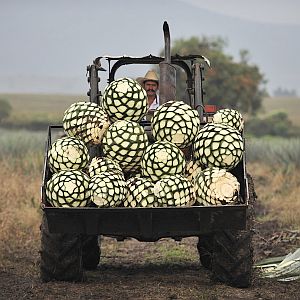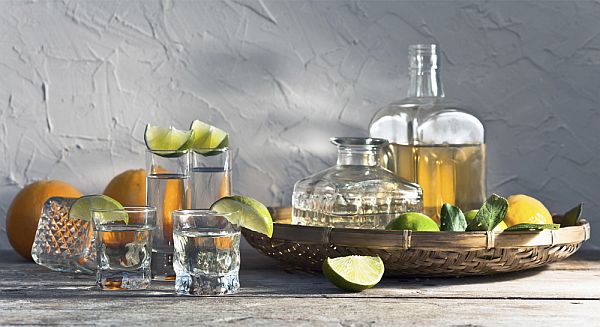Puerto Vallarta, Jalisco, Mexico - Travelers along the western coast of Mexico in the vicinity of Puerto Vallarta occasionally happen upon roadside vendors selling a moonshine mezcal called Raicilla (rye-see-ya).
The name "Raicilla" was originally used to disguise this type of mezcal in order to escape restrictions on alcohol production and the related taxes. My experience has always been that the sale of Raicilla was somewhat clandestine; sales being made on side streets or in small palapas clinging to the mountainsides at the edge of town. Packaging was usually a screwtop Coke bottle or some other recyclable container and the quality of the beverage verged on the raw side. Behind the harsh flavor, there was always an interesting aftertaste that brought me back and fueled my search for a smoother, more civilized, Raicilla.
For the past ten years I have crisscrossed Mexico looking for new tequilas and mezcals and adding to my research notes, always searching and sampling. Recently, I discovered a legitimate producer of Raicilla, one who has combined the best of historic techniques with the advantages of modern technology. This is the "Destiladora del Real" located in the mountains above Puerto Vallarta. In the past, this area was famous for its mining, and the well-paid miners expected their liquor to be of the best quality.
 |
Agave Lechugilla is somewhat smaller than the agaves that pulque and tequila are made from. As the agave matures it begins to put up a flowering stalk (quiote); this is cut off so that all of the plants sugars are directed to the heart. About the 8th to 10th year the plant matures and is harvested by "Jimadores" who cut away the spiny outer leaves with long handled knives (coas). The heart of the plant that remains looks like a pineapple and in fact is called a "piña." These piñas, weighing about one hundred pounds, are taken from the fields to the "taberna" where Raicilla processing takes place.
Every step of this process is done completely by hand. The piñas are placed in large wood fired brick ovens (hornos) where they are cooked for 24 hours. After cooking they are chopped into chunks with machetes and beaten into a pulp with large wooden mallets (mazos) in a wooden tray called a "batea."
The crushed agave and juice is placed in 100 liter wooden vats with copper bottoms (perols), or 55 gallon drums, where it ferments with the natural plant yeasts for 7–9 days. After fermentation is complete, a cap is placed on the vat and sealed with adobe mud, this is connected to a copper distillation coil and the vat heated.
After distilling for about 8 hours, the resulting distillate is a high quality, 100% natural Raicilla known as "Las Raicillas del Real" or "La Punta."
To appreciate the efforts that go into a "boutique" Raicilla, consider that it takes 15 pounds of agave to produce 1 liter of Raicilla, and that only 50 liters of distillate are made every 24 hours. Traditionally, the first few drops of distillate that emerge are tossed in the air, if it evaporates before landing, the brew is good.
Raicilla can be consumed straight in a Caballito (tequila shot glass), but is more commonly served chilled in a wineglass, on the rocks, or with Squirt or some type of grapefruit soda.
A popular saying of the Mexican people is "Para Todo Mal, Mezcal, y Para Todo Bien Tambien" (For everything bad, Mezcal, and for everything good too.)
 The number one selling and listing agency in the greater Bay of Banderas region since 2011, Timothy Real Estate Group is a locally-owned and operated real estate brokerage with a strategic location in the city's Romantic Zone. Because the Puerto Vallarta area has varying neighborhood personalities, we practice localized real estate and, with 5 sales offices around the bay, we know our communities well. If you are looking to sell or purchase a property in the Banderas Bay area, please contact one of the Timothy Real Estate Group agents for the best experience in Puerto Vallarta real estate. For more information, visit TimothyRealEstateGroup.com.
The number one selling and listing agency in the greater Bay of Banderas region since 2011, Timothy Real Estate Group is a locally-owned and operated real estate brokerage with a strategic location in the city's Romantic Zone. Because the Puerto Vallarta area has varying neighborhood personalities, we practice localized real estate and, with 5 sales offices around the bay, we know our communities well. If you are looking to sell or purchase a property in the Banderas Bay area, please contact one of the Timothy Real Estate Group agents for the best experience in Puerto Vallarta real estate. For more information, visit TimothyRealEstateGroup.com.Click HERE to learn more about Timothy Real Estate Group



